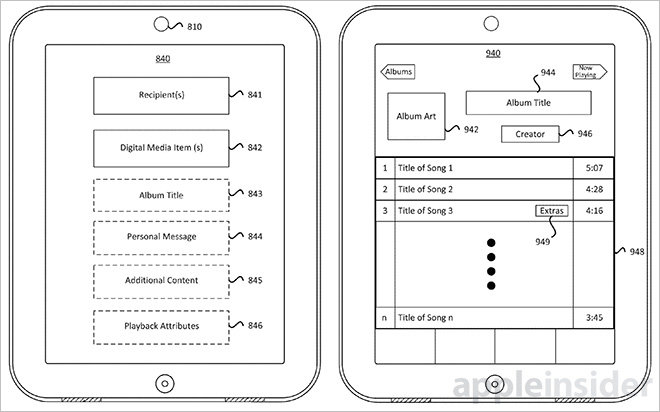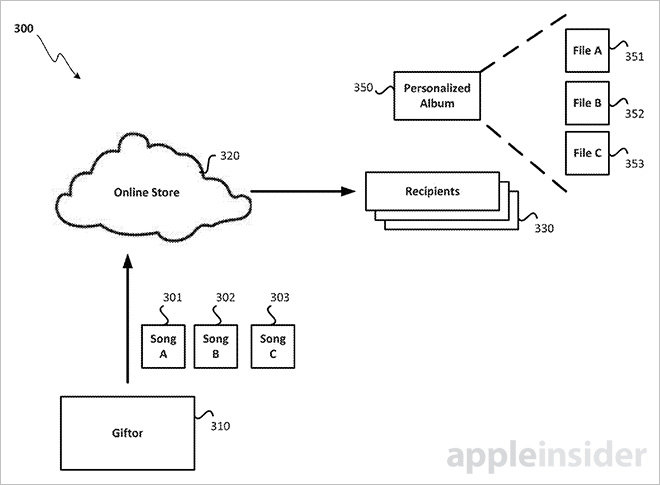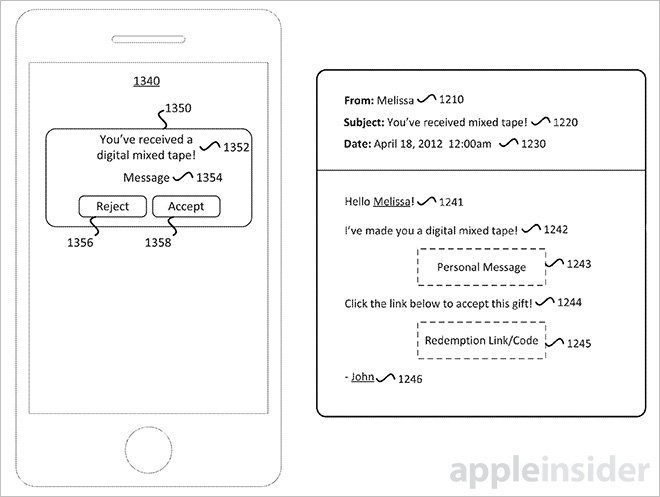In an era where on-demand streaming puts massive music libraries at your fingertips and sharing playlists takes but a few taps, receiving a personalized mix of tunes doesn't quite mean as much as it used to. But that could change if Apple employs its invention for "digital mixtape" gifting.
Described in a patent application titled "Digital mixed tapes" published by the U.S. Patent and Trademark Office on Thursday, Apple's idea is to tap into the nostalgia associated with swapping analog cassette tapes. More specifically, Apple is investigating methods by which personalized albums can be created, purchased and gifted from a cloud-based music service.
The system's mechanics are based on existing digital storefront technology and would therefore be familiar to anyone who has used iTunes or similar online services. Users select songs, movies, images and other digital media from their own library or an online store, then arrange the content, playback options and more to suit their needs.
Importantly, users would be able to apply highly specific personalization attributes to a gifted album. Beyond the usual track list options, gift givers might want to restrict a recipient's ability to fast forward or skip songs. Apple's system even allows for song titles to be revealed one at a time as they are played. Playback settings are embedded as metadata and are carried over when an album is downloaded or streamed.
Mixing in multimedia like photos or iBooks adds another layer of personalization options. Here, users can choose to display an image or series of images set to a backing track, akin to a custom slideshow.
On the receiving end, the store sends out an email or push notification to alert a user that they have a digital mixed tape waiting, presenting options to accept or reject the album. A gift giver is charged when a recipient accepts, but gets their money back if the album is rejected.
The remainder of Apple's patent application deals with song licensing, pricing and a details regarding cloud resources. Methods of implementation and alternative embodiments are also described.
Existing services like Tapely offer similar tools for creating and distributing digital mixtapes, but none can rival iTunes' content library or instant access to a user base numbering in the millions. In fact, older versions of iTunes — and the erstwhile Ping social network — allowed users to gift and share playlists, but the method was nowhere near as comprehensive as Apple's mixed tape invention.
It is unclear if Apple plans to implement a version of today's invention in a future iteration of Apple Music or iTunes, but the technology is already in place for a rapid rollout should the company choose to do so.
Apple's digital mixtape patent application was first filed for in April as a continuation of a provisional patent from 2012, both of which credit Gregory F. Hughes as their inventor.
 Mikey Campbell
Mikey Campbell






-xl-m.jpg)


-m.jpg)






 Amber Neely
Amber Neely
 William Gallagher
William Gallagher
 Malcolm Owen
Malcolm Owen

 Mike Wuerthele
Mike Wuerthele


 Thomas Sibilly
Thomas Sibilly








9 Comments
Sort out sharing playlists in Apple Music first pls.
Kind of like mixing Shutterfly with iTunes. Could be neat. Hopefully available to Windows users too. Currently, photo books are limited to Mac users.
[quote name="AppleInsider" url="/t/187511/apple-invention-looks-to-revive-the-mixtape-with-a-digital-twist#post_2757341"]...but gets their money back if the album is rejected.[/quote] Oh my - a rejected mixtape that you've put a lot of thought and effort into creating - that's got to sting a little! :(
This is an epic concept. I really think this would resonate with younger generations who love to customize things. It would be very important to customize album art on the tape and such which I am sure it in the model.
I have wanted this feature for years! However if it's a public patent I doubt we'll ever see it.